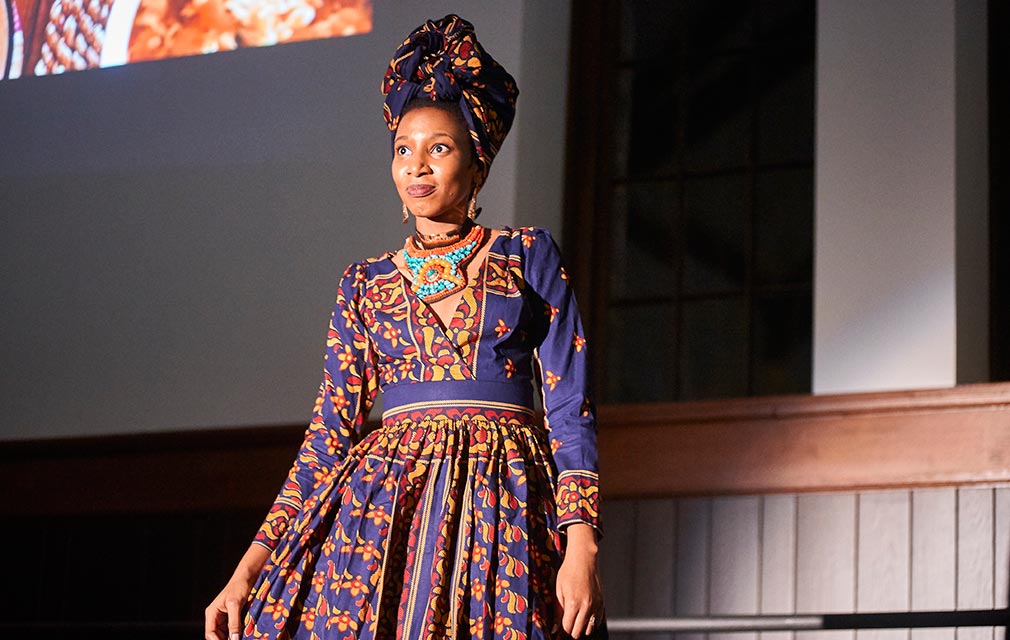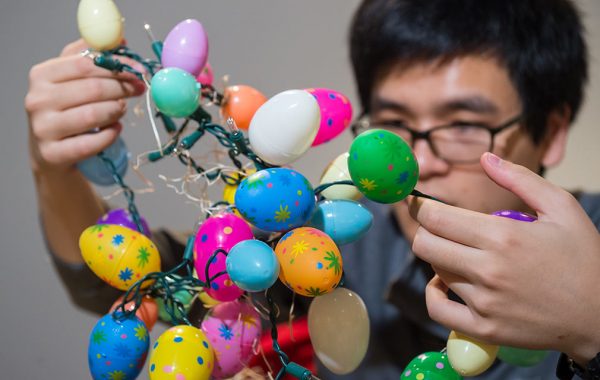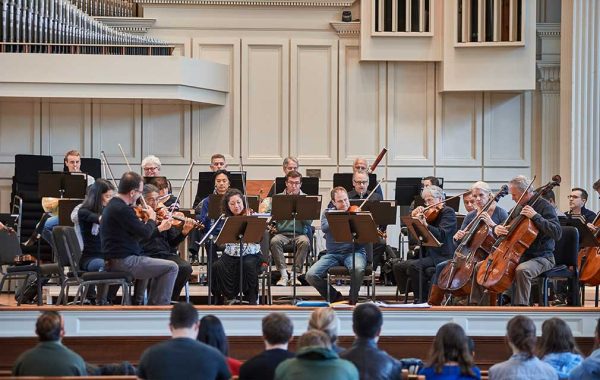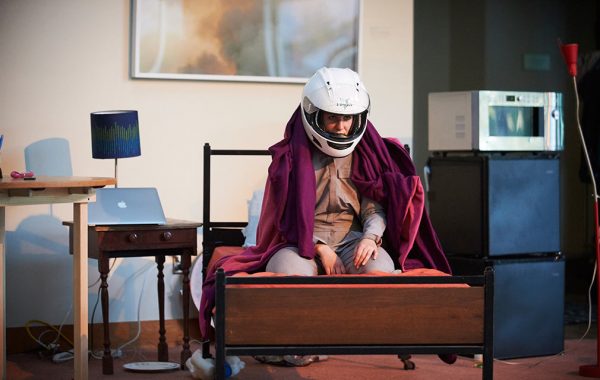Above: Celebrating the continent and its nations’ cultures, the African Fashion Show filled the Hall of Presidents on November 12. (Photo by Zoe Zhong ’17)
Love, Africa
With a backdrop of African flags and an Afrobeat soundtrack, students modeled colorful styles at the third annual African Fashion Show. Celebrating the continent and its nations’ cultures, this year’s event — called Love, Africa — filled the Hall of Presidents on November 12.
 Designers Bamboo Stitches, Obioma, Missy Temeke, Queen W, and Queen Irie created the fashions on display; comedian Ebabykoby emceed the show.
Designers Bamboo Stitches, Obioma, Missy Temeke, Queen W, and Queen Irie created the fashions on display; comedian Ebabykoby emceed the show.
Guests enjoyed a feast — meat pie, coconut rice, fish balls, roast beef kebabs, plantains, and banana bread — catered by Agape Glory Services, owned by the mother of Sharon Nicol ’17.
“This year’s show was the best we’ve had so far,” said founder and coordinator MariaDorin Shayo ’17. “I can’t describe the joy I felt when everyone was getting food and looked so excited.”
The African Student Union (ASU) and partners Gamma Phi Beta, Brothers, Black Student Union, Caribbean Students Association, and Sisters of the Round Table sponsored the 2016 showand raised money for Hope For Haiti.
“I love seeing people come together to see the Africa that I know — not the stereotypical one awash with war and hunger, but the diverse Africa and the resilience of the people who are thriving,” Shayo said. “It’s great to tell that other story.”
— Meredith Dowling ’17
Orpheus: a dynamic democracy
The Grammy-winning Orpheus Chamber Orchestra, famed for its democratic approach to music making, performed at Colgate on October 23, just before its date at Carnegie Hall.
Founded in 1972, the New York City–based orchestra was among the first chamber orchestras to function without a conductor. Instead, the musicians work collaboratively.
“You need many more rehearsals for all of the musicians to determine what the interpretation of a work is going to be,” said Marietta Cheng, professor of music and Colgate University Orchestra conductor. “But because there is so much personal input from each musician, you see a greater commitment and devotion. There’s a certain joy the musicians have in giving it their all.”
At Colgate, Orpheus’s 38 performers partnered with renowned German pianist Christian Zacharias for a dynamic concert featuring Mozart’s Overture to La Clemenza di Tito, Beethoven’s Piano Concerto No. 1, and Bizet’s Symphony in C Major, as well as a world premiere of Jessie Montgomery’s Records from a Vanishing City.
Prior to the concert, the musicians (who previously performed at the university in 2008) hosted an open rehearsal followed by a Q&A session with students from Colgate’s orchestra. Sponsored by the Christian A. Johnson Fund, the event gave students insight into teamwork and how collaboration produces better results.
“You can imagine that if you have that many people working together, they’d have quibbles over different interpretations of tempo, style, phrasing, and dynamics,” Cheng said. “So they have to come to agreement for a successful end result.”
Rachel Kierstead ’19, a Colgate University Orchestra violinist, agreed. “The musicians’ ability to listen to each other and accept criticism before the entire group is a model that we can all learn from,” she said, “whether we’re in music, business, or any other pursuit that involves working with others.”
— Brianna Delaney ’19
Rubbish gets a redesign

During a workshop with visiting artist Reet Aus, Haoqi Xia ’20 works on a project incorporating found objects. (Photo by Mark DiOrio)
“Who knew that so many new things could be made from junk?” said Fiona Adjei Boateng ’19, a theater student who was making handbags out of denim pants during an upcycling workshop.
Reet Aus, an Estonian fashion designer and environmental pioneer, hosted the workshop in Clifford Gallery. She is known for upcycling, which is using discarded materials to make beautiful new products. Aus was in residence at Colgate for 10 days — a joint venture with the theater department, environmental studies and film and media studies programs, sustainability office, and art and art history department.
Transforming materials sourced from the Madison County Solid Waste and Recycle facility as well as Syracuse Rescue Mission, students created jewelry from metal wire, clothing made from fabric remnants, and found art pieces.
In Aus’s lectures on campus and in the screening of her documentary Out of Fashion, she explained that to keep up with the fast pace of fashion trends, clothing companies use wasteful manufacturing practices to produce cheap garments. “On average, eighteen percent of the textiles processed in clothing factories are leftovers, and are thrown away,” she said in Golden Auditorium on November 2. These materials end up in landfills, which pollute the air, water, and soil.
“Working with Reet throughout the week was eye opening,” said Boateng. “I still can’t believe how much waste the clothing industry creates.”
To address the problem, Aus and her colleagues created Upmade, a software program and certification that helps factories reduce waste by upcycling leftover fabric back into the production process. Two major factories in Estonia and Bangladesh have received certification so far.
“Reet Aus is a true leader and planetary hero,” said John Pumilio, Colgate’s director of sustainability. “She demonstrates how it’s possible to pursue our passions with social consciousness and environmental stewardship as a cornerstone.”
Aus also addresses the social and moral implications of fast fashion, noted studio art major Kris Pfister ’17, who was inspired to use recycled materials in a senior art project. “Her work is a tangible force of resistance to the materialism the Western world has become so accustomed to.”
— Emily Daniel ’18
At home on Mars
Real science fused with science fiction when Dani Solomon ’13 performed One Way Red, a solo show that followed a young woman’s one-way journey to Mars. The 90-minute performance on October 6 unfolded as Sam, played by Solomon, stumbled upon an online video about Mars One — an actual nonprofit that intends to colonize Mars by 2026.
The performance jumps back and forth between Sam’s bedroom, where she applies for the Mars One project, and the surface of the red planet. There is both humor and profound loneliness as Sam leaves Earth to experience Mars.
“We didn’t start with a script,” Solomon said. She and her collaborator, Mason Rosenthal, use an unconventional approach to theater in their work with Philadelphia-based Medium Theatre Company. “We start with a question or curiosity. We often start from a known, familiar place, and through the process of following a curiosity, we follow the known into the unknown.”
Space travel has long captivated Americans’ imaginations; One Way Red questions why we look spaceward and what we hope to find there. The possibility of interplanetary travel serves as the backdrop for this existential fever-dream populated by alien mirrors, talking lamps, and a sassy computer assistant named Morgan.
“I think a lot of people in our generation want to do something exceptional to be remembered,” Solomon said. “This character has a lot of that drive, that ambition to do something great and historical.”
Solomon, who was a physics and theater major at Colgate, is interested in the process of discovery found in both the sciences and the theater. The play was performed in the Ho Atrium, allowing the arts and sciences to mingle while bringing the audience to an otherworldly space between reality and fiction.
In addition to performing the play, Solomon gave a talk about alternative career paths for physics majors. She and Rosenthal also hosted a workshop that encouraged students to explore unconventional approaches to theater.
Solomon hopes that there will be more intermingling of the arts and the sciences in the future, especially at Colgate. “Getting people from different disciplines to ask hard questions together is the next step toward interdisciplinary dialogue,” she said.
— Emily Daniel ’18








